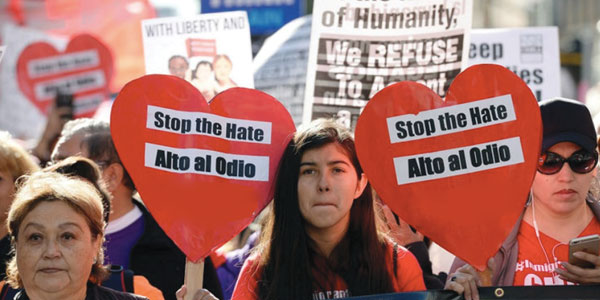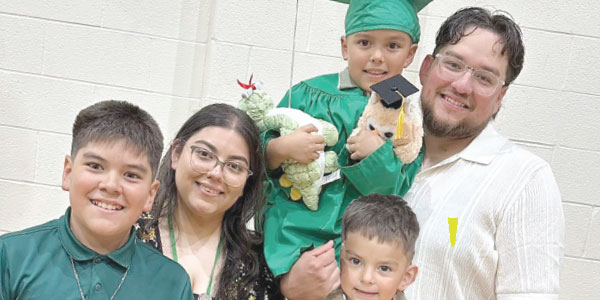
By Angie Baldelomar
A recent survey from the Pew Research Center revealed it is harder to be Latino in the United States now than it was before Donald Trump was elected president.
Nearly half of the Hispanics surveyed said the situation has worsened for people of their ethnicity in the past year – up from a third just after the 2016 elections. A similar number said they were insecure about their place in the United States with Trump as president.
The survey included citizens and non-citizens, immigrants and native-born people, and came out during the final days before the midterm elections, when the Trump administration was continuing its attempts to curb both legal and illegal immigration.
About two-thirds of Hispanics said the government’s actions had been harmful to Hispanics. Those actions included lowering the bar for deportation, the now-gone policy of separating families at the border, scaling back protections for Deferred Action for Childhood Arrivals program recipients and reversing parts of the Affordable Care Act.
Mayte Diaz, a University of Kansas sophomore studying political science, said she has seen a change in how Hispanics are treated under the current administration. The DeSoto, Kansas, native of Mexican parents thinks racism and bigotry have gained a platform.
“It’s gotten to a point where people think it’s OK to bash people. … We, as a society, are regressing instead of progressing,” Diaz said.
Diaz said her ethnicity always made other people treat her differently. When she was in elementary school, she was asked to stop speaking Spanish on the bus, she recalled.
“But, of course, those were more isolated incidents,” Diaz said. “Now, the hate is more acceptable.”
According to newly released FBI data, hate crimes in the United States rose 17 percent in 2017, the third consecutive year there has been an increase in hate crimes. About 3 out of every 5 hate crimes targeted a person’s race or ethnicity.
What bothers Diaz the most about the current situation is the blatant and open hate she sees the president promoting.
“I think it’s very unfortunate, very frustrating and belittling to be the ‘other’ in a country where we’ve been our whole lives,” she said. “It makes you feel very powerless.”
Diaz said it is probably more difficult for Latinas because gender also plays a role.
“The administration has been very hateful to women,” she said. “To add (gender) into the mix of barriers, it just adds another layer to the hate.”
______________________________________________________________________________________________
Situación ha empeorado para los latinos con Trump como Presidente, revela una encuesta
Una encuesta reciente del Pew Research Center reveló que es más difícil ser latino en los Estados Unidos ahora que antes de que Donald Trump fuera electo presidente.
Casi la mitad de los hispanos encuestados dijeron que la situación ha empeorado para las personas de su etnicidad en el último año, en comparación con un tercio que opinaba lo mismo justo después de las elecciones de 2016. Un número similar dijeron sentirse inseguros sobre su lugar en los Estados Unidos con Trump como Presidente.
La encuesta incluyó a ciudadanos y no ciudadanos, inmigrantes y personas nativas, y salió durante los últimos días antes de las elecciones de medio término, cuando la administración de Trump continuaba sus intentos de frenar la inmigración legal e ilegal.
Alrededor de dos tercios de los hispanos dijeron que las acciones del gobierno han sido dañinas para los hispanos. Esas acciones incluyeron bajar el nivel de deportación, la ya desaparecida política de separar a las familias en la frontera, reducir las protecciones para los beneficiarios del programa de Acción Diferida para los Llegados en la Infancia (DACA) y revertir partes del Affordable Care Act.
Mayte Díaz, una estudiante de segundo año de la Universidad de Kansas que estudia ciencias políticas, dijo que ha visto un cambio en cómo los hispanos son tratados bajo la actual administración. La nativa de DeSoto, Kansas, de padres mexicanos, piensa que el racismo y el fanatismo han ganado una plataforma.
“Se ha llegado al punto donde las personas piensan que está bien atacar a otras personas. … Como sociedad, estamos retrocediendo en lugar de progresar”, dijo Díaz.
Díaz indicó que su etnicidad siempre hizo que otras personas la trataran diferente. Se acuerda de la vez cuando estaba en la escuela primaria en que le pidieron que dejara de hablar español en el bus.
“Pero claro, esos eran incidentes más aislados”, explicó. “Ahora, el odio es más aceptable”.
Según datos recién publicados por el FBI, los delitos de odio en los Estados Unidos aumentaron en un 17 por ciento en 2017, el tercer año consecutivo en que ha habido un incremento en delitos de odio. Aproximadamente 3 de cada 5 delitos de odio atacaron la raza o etnicidad de una persona.
Lo que más le preocupa a Díaz sobre esta situación es el odio abierto y visible que ve que el Presidente promueve.
“Creo que es muy desafortunado, muy frustrante y despreciativo ser el ‘otro’ en un país en el que hemos estado todas nuestras vidas”, dijo. “Te hace sentir muy impotente”.
Díaz dijo que la situación sea probablemente más difícil para las latinas porque el género también juega un papel.
“La administración ha expresado mucho odio contra las mujeres”, dijo. “Si agregamos género a la mezcla de barreras, sólo añade otra capa al odio”.










